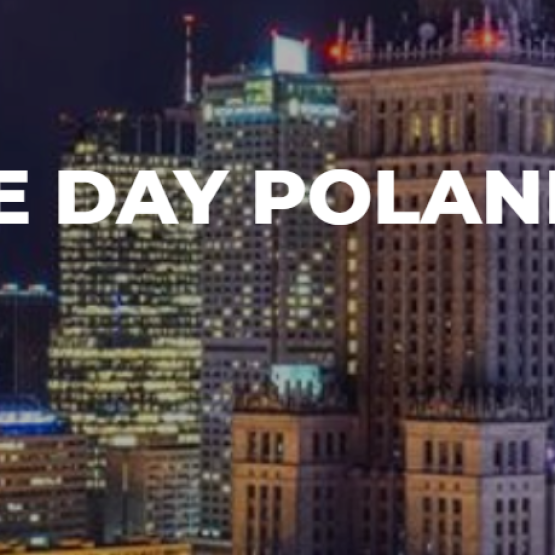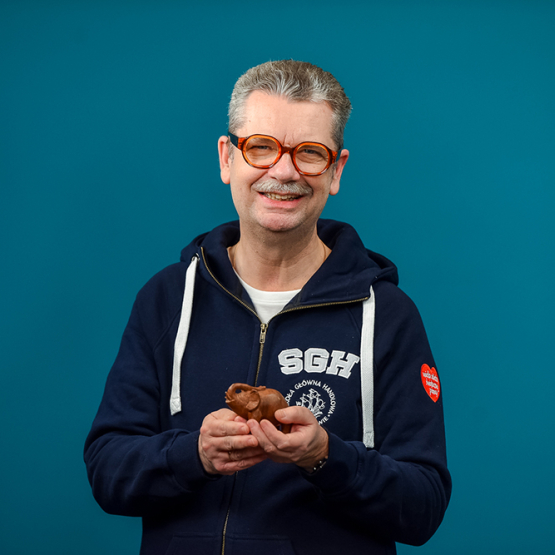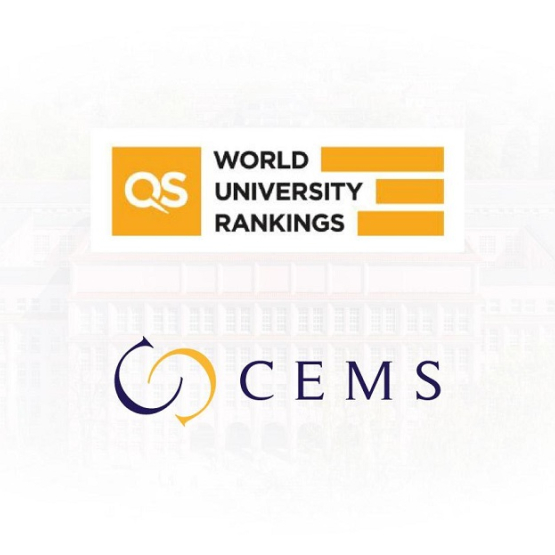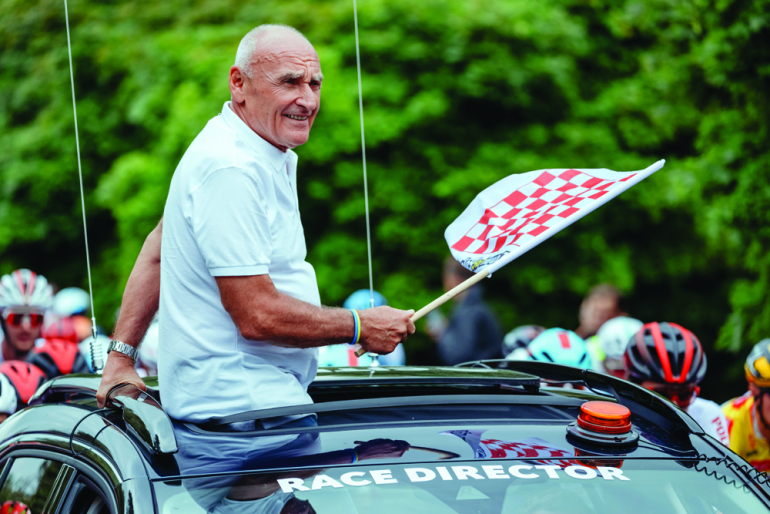
Interview with a laureate of SGH Economic Award 2023, world championship medallist, vice-champion from the Moscow Olympics (1980) in road bicycle racing, entrepreneur, organiser of Tour de Pologne, Czesław Lang
Magdalena Bryk: Since early childhood your life has been connected with cycling. Was there any plan B? If not cycling, what would you have been doing?
Czesław Lang: As an alternative for cycling, I wanted to be a forester, and I guess that’s what I wanted the most. As an alternative, I could also be a carpenter. I even have my own small workshop; I like the smell of wood and woodwork itself. It is so real, it fills me with good energy. This is something that has always appealed to me. I had even been prepared to go to a forestry school – I love the nature and the forest. I could live in a forest without leaving it.
But I suppose you have never regretted your decision, even during heavy winter trainings in snow or heavy rain?
Definitely not. It was a beautiful adventure. Bicycle racing is a sport for gladiators. Many people have recently taken up cycling. They ride 200 km and think “riding 200 km is not a big deal”. But recreational cycling and bicycle racing are two totally different things. An example I always give is that of a shooting range where anyone can go and shoot targets, but not everyone will wear a bulletproof vest, take grenades and a gun and go to the front line. This is also the difference between cycling, even long-
-distance, and high speed road racing. Totally different thing, mentality, different adrenaline.
What would you say is your biggest sport success? The Olympic medal?
Definitely, an Olympic medal stays with you for the whole life. Scientists earn titles of doctor, professor, while I have the title of not only an Olympian, but also an Olympic vice-champion. I’ve won it for life and it’s something very valuable for me.
In 1980 in Moscow not only did you win a medal, but were also promised to be allowed to travel to the West. That’s how you ended up in Italy. What surprised you in professional bicycle racing and in the Italian attitude to life?
It was a totally different world. Everything was organised differently, everybody had the same shirt, the same equipment, bicycle, shoes, you didn’t have to worry about anything. Besides, Italians also ate differently, their Mediterranean diet included a lot of carbohydrates.
No bigos (traditional Polish sauerkraut stew) before competition?
No, there was no bigos (he laughs). And the racing itself was different. Here the distance was shorter, not more than 180 km, and in Italy 280-290 km, so you had to adapt mentally to spend many hours on a bicycle. It was really hard work. As a winning cyclist, in my professional group I had to give up my ego and look for another place in the team; you were supposed to work for the captain. There was capitano Moser or capitano Saronni, and it was their results, not ours, on the basis of which managers obtained sponsorship contracts. This meant money for all of us.
What do you tell people who want to follow you and cycle professionally?
It is a hard sport, and you have to love it. You cannot do road racing for money. Wealth and contracts may come in the future, but if you don’t love the sport, the risk, the effort, the pain... You really do suffer during an uphill climb. It is a battle with yourself and the best meditation. Your mind has to be extremely strong - if you get to love it, if you enjoy it, if you challenge yourself, if you can work hard, success will come, and so will the money. But you simply have to love it.
So is it the mindset, the involvement, and hard work that you have transferred to business? After completing your professional sports career you’ve become a professional businessman. I presume that the persistence and diligence proved useful. What else have you taken from sports to business?
Definitely being a professional cyclist, having ridden in races like Tour de France, Giro d’ Italia, Peace Race, having fallen many times, having gone through and recovered from difficult situations - that is the best school of life. This makes it easier to run a business, to set goals beyond sports. However, the very moment of ending a career and being forced to find something new is not easy. Looking across different sport disciplines, we can see that many sportspeople suffer from breakdowns, they abuse alcohol, come up with weird ideas for businesses which further go bust, etc. What helped me was common sense and awareness that the money had been earned with hard work. Still, if I had had another chance, some of my decisions would have probably been different, some things I would not have done.
Can you tell us how you’ve ended up managing Tour de Pologne?
Along the way I had other businesses: a bicycle shop, a restaurant, branches of other firms, but I was still very attracted to cycling. For many years I had lived in Italy, and I knew that lots of Italians ride bicycles, have cycling events, while we had to go to France or Italy to make it matter. I observed the 55th jubilee edition of Tour de Pologne being sidelined and falling apart just as the Peace Race and other races in the eastern part of Europe. And we had no race in which the best cyclists would like to participate. That was when I started to dream to elevate Tour de Pologne and make it a prestigious cycling event. That’s how I’ve reached 30 years working with the race.
A beautiful jubilee. But also a lot of work, right?
Oh yes. And it is a hard work. Even before the start of this year’s edition we started to plan the next one, and now I’m thinking intensively about the next year. This involves a lot of travelling, numerous meetings. It’s definitely the most complex logistic undertaking in sports, nothing can compare. A football match, athletic meeting, climbing competition - all these are held in one place, sometimes two. A cycling race covers thousands of kilometres across the country, everything has to be secured, traffic has to be changed, people have to be engaged to ensure safety. It’s a gigantic and costly project. You have to find sponsors, produce signal for TV broadcast to show the race. As for the sports perspective, I have to admit that we’re at the top - nothing more can be achieved. There’s Tour de France, Giro d’Italia, and us - the same regulations, the same rules.
And all of this is a recovered race. Definitely a monumental attainment. Is there anything from Italy, or from abroad, that was of use when you were developing your business in Poland?
I have spent many years abroad, initially as a professional road cyclist, and then three years as a founder and manager of the first Polish-Italian professional cycling group Diana Colnago Animex, whereby I have learnt not only languages, but also people. You have to talk to people, be with them. I had given up being a manager as I had found being a sports director boring, but the experience was useful for building the position of Tour de Pologne. I knew representatives of all the major races, which helped me communicate our ideas and plans. That was when we invited the director of International Cycling Union (UCI), director of Tour de France, to show how we do it in Poland. This was a way to build the brand of the race - that it is good and safe; and each year the quality of the event was better. After the cycling reform UCI chose the best races, so called ProTour races, and ours was included in an official calendar of ProTour events. This automatically guaranteed us participation of world top teams. Best teams of the world attract media, media in turn bring sponsors, and that’s how it goes.
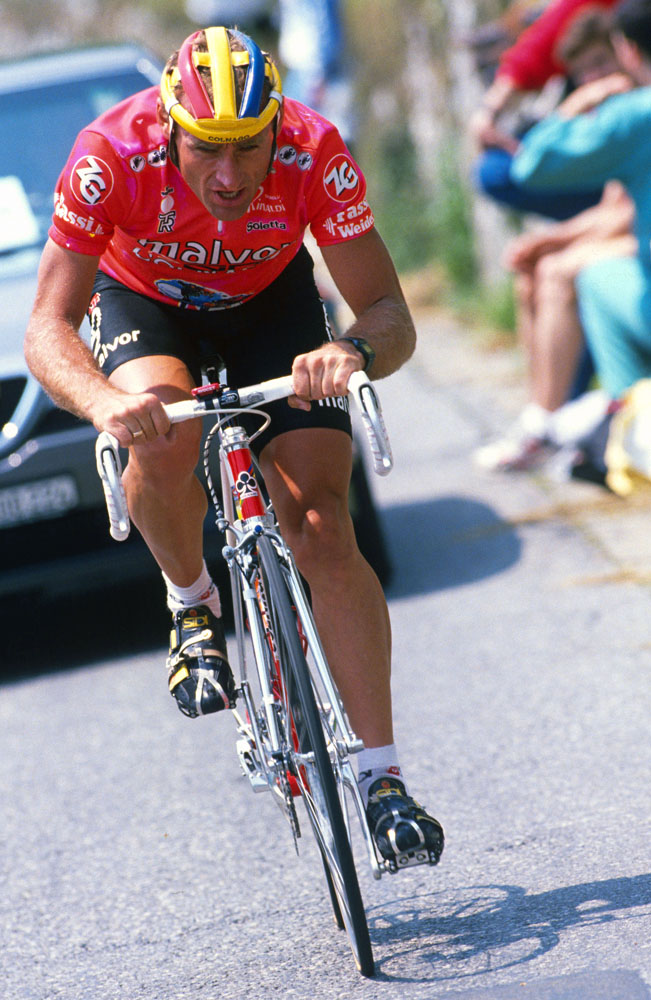
Czesław Lang representing the Italian team Malvor-Sidi in 1989.
PHOTO: CZESŁAW LANG’S ARCHIVE
Talking about sponsorship and money - can you reveal a little bit about the practical aspect of Tour de Pologne? What is the budget for such an enormous event?
Tour de Pologne budget is huge, these are millions of euros we’re talking about. It is a massive project. Over a thousand people follow the race, and they all have to be accommodated and fed. Moreover, there are the awards, reimbursement of travel costs for professional groups, TV production, including money for broadcast signal along the entire route. All the money has to be collected to make such a big event viable.
Does the renown of the race help? Do sponsors come on their own or do you have to persuade them?
You always have to approach and persuade them, list all the covered costs, equivalents etc. I have to admit here that Orlen helps a lot, not only us, but also ski jumpers, athletes, volleyball players. Their support and engagement is enormous. Attracting big foreign companies and bringing them to Poland to collaborate in such a massive event is very difficult.. We are still perceived as a “third country”, good for earning money but not for investing. We had Carrefour, they were with us for a few years, but finally it withdrew from Tour de Pologne and shifted to La Vuelta a Espana. For 30 years we have been working with multiple firms, also foreign ones, e.g. Fiat. But in recent years I have observed that global brands are less willing to participate in such activities - there’s a trend to form conglomerates or large groups. For example you don’t talk to Opel, Citroen or Peugot anymore, they all operate under one owner. So if Opel is not in, you can’t go to Citroen, because there’s someone from the board who hasn’t given their consent. These are advantages of globalisation: competition reduces, but when there’s no competition, there’s monopoly, and a monopolist thinks that it can do everything.
In your opinion, how much can Poland gain due to the race in terms of promotion and employment?
For many years had I felt we had lacked this second path that the French have with Tour de France. What I mean is that planning a route for a race you can show your own country and its beauty - a little bit of history, a little bit of modernity, some interesting features. In recent years we have placed considerable emphasis on this, and in cooperation with television a team of people was formed that in advance go along the race route and show the interesting sites, the history. This year we showed the beauty of Dolny Śląsk (Lower Silesia), Wielkopolska (Greater Poland) or the eastern stripe of Poland: Roztocze and Podkarpacie (Subcarpathia). Poles are amazed that their country is so beautiful. It is presented in an interesting way. Road cycling is a great opportunity to promote our land. Our competition is one of the three races broadcast from start to finish, and we should take advantage of it!
The broadcast reaches over 100 countries across the world. It’s 5 hours of coverage daily, 35 hours in total. The interest is really big, and I think this is the cheapest promotion we can imagine. There are emotions, the race, Kwiatkowski, Majka, and in the background the beautiful Książ Castle. Not everybody knows and values this, but I am glad to show the beauty of Poland.
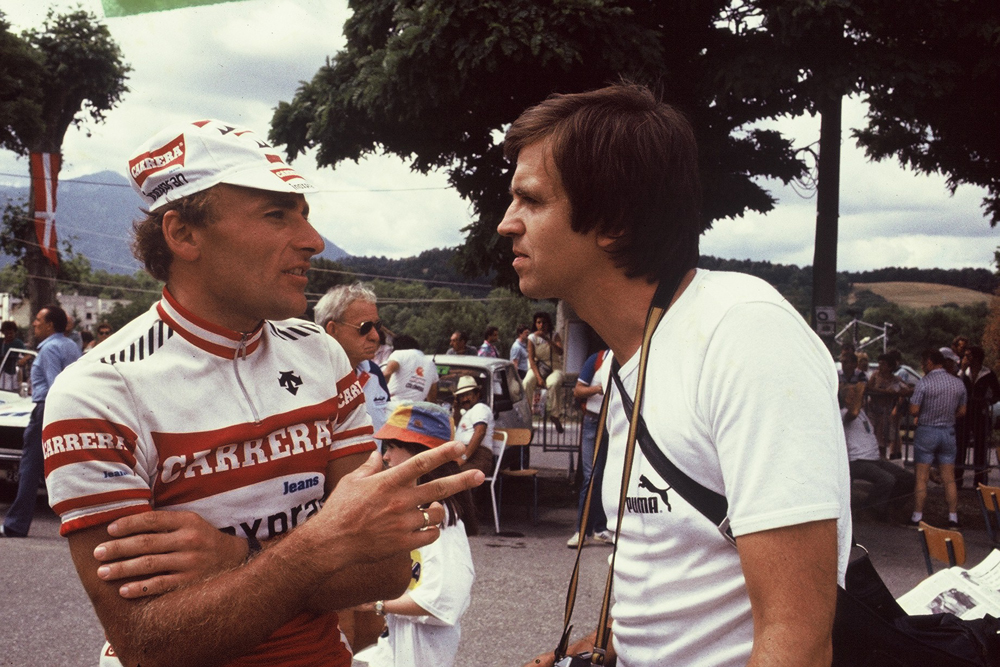
Is this also the reason why you choose different routes? To show different parts of Poland?
Exactly. Besides, for 30 years of the race roads, hotels have changed, and we show that. We have the best hotels of all the races. During the race we tend to each detail, safety, hotels, amenities, etc.
So the world can see the prestige of a professional event in a beautiful surrounding.
That’s right.
What is it that disturbs you, what are the hurdles in the Polish economic environment from the perspective of a successful businessman?
My business is fairly stable, but apart from that I am a farmer and currently what disturbs me the most is the weather: it’s raining, and I cannot harvest my crops (laughs). But returning to your question - there are always some problems, but a stable business and experience make things easier.
How do you run your business? What are your values and what principles do you apply, also when selecting people to your team?
You have to be reliable, certainly. You cannot promise pie in the sky and then turn your words on their heads and claim you didn’t say it. What you say must be carefully thought out and phrased. Besides, it’s important to know how to set goals. When I set a goal, I follow it persistently, both in sports and in life. As a sportsman I strived for world championship and an Olympic medal, and I succeeded. When I launched Tour de Pologne, I aimed at making it one of the major races, and I did it. This is also a key for selecting a team. If a leader does not know what they want, the team is diluted, there’s no clear target to follow. Messages are contradictory, people get anxious, and finally leave. When the goal is clearly defined and duties are clearly distributed, everybody knows what they’re supposed to do. I don’t control how many hours people work, I want them to be effective - the accounting, hotel reservation, specific marketing measures. I don’t care whether they come to work at 9.00, at 7.00 or at 12.00. What is important is the result, so people are also determined to reach it.
Very wise attitude. While recruiting employees, do you look for sports in their CVs? Do you feel closer to sportspeople among those who you cooperate with?
Yes. I believe that a sportsperson has this added value which makes them strive for success, set goals, and work hard. If they weren’t hard-working, they wouldn’t be climbing so fast, running or cycling. A sportsperson is also more committed. If I can see that a person has a passion, I definitely feel connected to them.
For many years you have been a symbol of success, not only in sports, but also in business. You are your own brand, you have won numerous prizes. Which one is the most precious?
I can’t say, because I don’t want to offend the other ones (laughs).
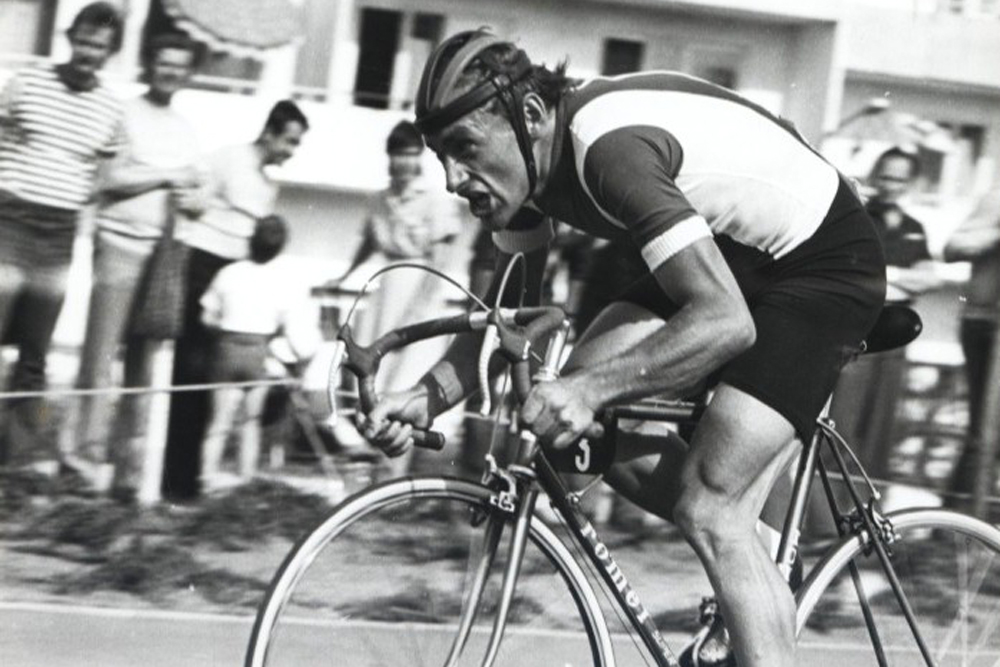
So they are all precious? I’ve noted down only some of them: Ambassador of Polish Sports, Bene Merito honorary distinction, Honorary Demes, Personification of Poland’s Global Success. And prizes for the race: „Teraz Polska” Emblem, Golden Logo Poland, Success of the 25th anniversary of Polish Freedom, Best Sports Event of „Przegląd Sportowy” magazine, and so on, and so forth. There are quite a few.
Certainly the most precious are those which promote Poland globally. This is the aim of what I do. In my sports career I used to wear red-and-white shirt, and I was very proud of being Polish. I used to do it in all races. This is the way I was raised. It is my belief that by representing my club and my country I make people happy, and this continues to be my goal.
One of your prizes is also our SGH Economic Award. Since 2019 SGH Warsaw School of Economics has been distinguishing people with achievements in entrepreneurship and innovation, or those who contributed to the economic development of Poland. What does this award mean to you?
It is a great distinction and honour. Tour de Pologne undoubtedly contributes to Poland’s economic development by promoting our country. When we enter different towns with the race, all the hotels liven up, the infrastructure is upgraded, and so are roads, which stay after the event. There is a village in Podkarpacie (Subcarpathia), where the village mayor could not sell construction and investment plots of lands for many years. After Tour de Pologne rode through the village, all the plots were sold in two days. So this is how it works. Another example - there was a French group that was making a documentary about the race. These people were approaching the retirement age and said that they wanted to spend their retirement in Poland. France was not good for them anymore because all the tensions and turbulent times. They said our region was beautiful, peaceful and safe, and we don’t appreciate it.
Do you feel fulfilled, or do you still have some business-related or professional dreams to realize?
We’re planning to relaunch women’s Tour de Pologne, talks are underway. Next year we want to do three stages of the women’s race. We’re looking for sponsors, talking with the media. We’re also planning cyclo-cross, something the Dutch and Belgians do, to take advantage of the autumn and winter season. Such “mud racing” is fun and spectacular to watch. We also want to expand Orlen Nations Grand Prix, which we also organise. This year it was held in four countries: Czechia, Hungary, Slovakia and Poland. We want to expand it, just as Orlen is expanding into more countries. It’s a really cool, longer race for riders under the age of 23, who are out of the Junior category, and are not yet good enough to do fully professional racing, or are still waiting for such contracts.
Do you plan to retire at all, or would you rather die on a bike?
I’ve already retired. But I love what I do and will probably die riding this bike (laughs).
In that case, what do you wish for yourself?
Probably the same as everyone else: love, happiness, and good energy.
Let me wish you exactly that, then. Thank you very much for the interview.
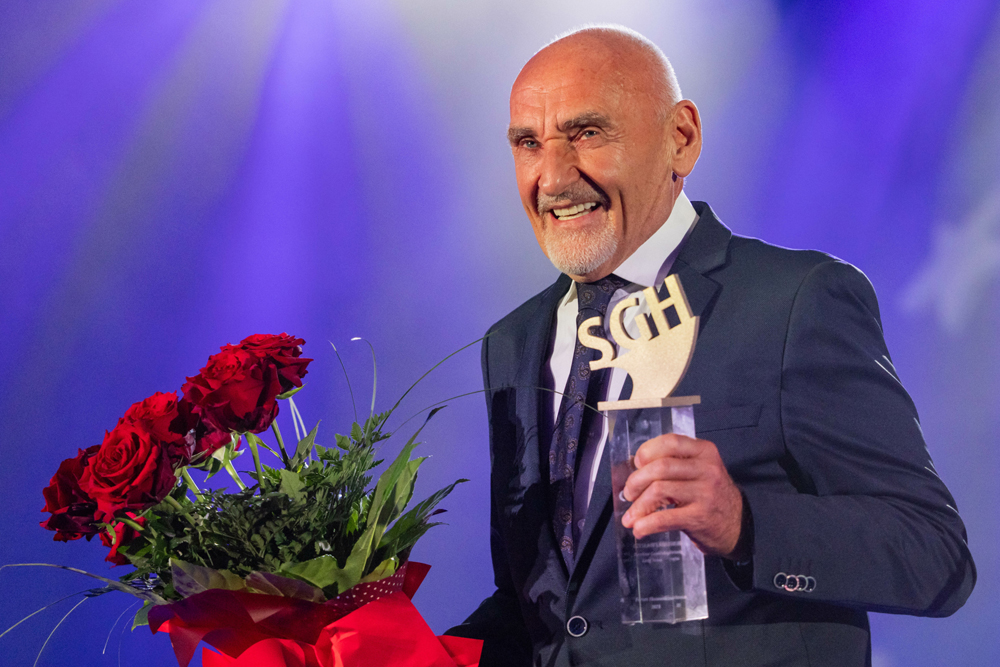
Laureate of the SGH Economic Award 2023
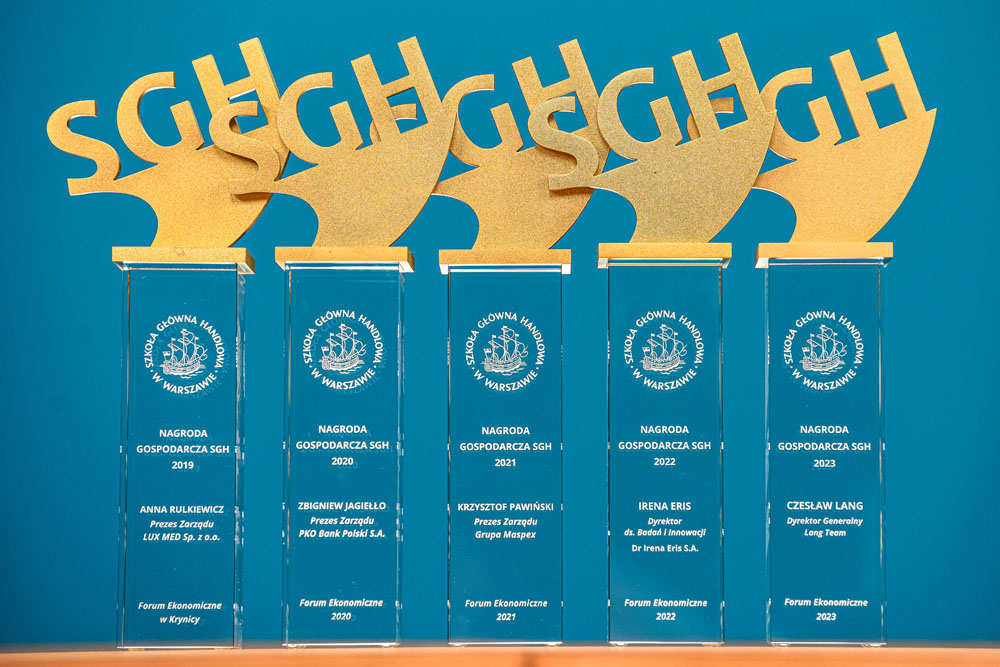
SGH Economic Award was established in 2019, and its first laureate was the president of LUX MED Group, Anna Rulkiewicz. She was awarded for activities that made LUX MED Group a leader of the Polish private healthcare industry.
In 2020 the Award was given to the president of PKO Bank Polski, Zbigniew Jagiełło, for enhancing the position of the PKO Business Group as a leader of the financial market in the Central and Eastern Europe.
The 2021 SGH Economic Award went to Krzysztof Pawiński, co-founder, co-owner, and currently also the president of the Management Board of Maspex Group, one of the biggest food producers in the Central and Eastern Europe. Maspex is the leader of the juices and still beverages market. Its products are sold to 60 countries across the world. The company works with over 200 business clients.
In 2022 the winner of the SGH Economic Award was dr Irena Eris, founder and owner of the firm Dr Irena Eris. For almost four decades dr Eris has been among the top Polish business leaders, successfully expanding her skincare cosmetics firm, renowned for its high quality in Poland and abroad.

